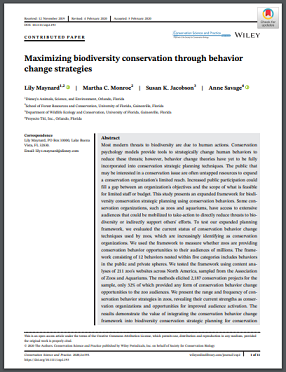
Most modern threats to biodiversity are due to human actions. Conservation psychology models provide tools to strategically change human behaviors to reduce these threats; however, behavior change theories have yet to be fully incorporated into conservation strategic planning techniques. The public that may be interested in a conservation issue are often untapped resources to expand a conservation organization's limited reach. Increased public participation could fill a gap between an organization's objectives and the scope of what is feasible for limited staff or budget. This study presents an expanded framework for biodiversity conservation strategic planning using conservation behaviors. Some conservation organizations, such as zoos and aquariums, have access to extensive audiences that could be mobilized to take-action to directly reduce threats to biodiversity or indirectly support others' efforts. To test our expanded planning framework, we evaluated the current status of conservation behavior change techniques used by zoos, which are increasingly identifying as conservation organizations. We used the framework to measure whether zoos are providing conservation behavior opportunities to their audiences of millions. The framework consisting of 12 behaviors nested within five categories includes behaviors in the public and private spheres. We tested the framework using content analyses of 211 zoo's websites across North America, sampled from the Association of Zoos and Aquariums. The methods elicited 2,187 conservation projects for the sample, only 32% of which provided any form of conservation behavior change opportunities to the zoo audiences. We present the range and frequency of conservation behavior strategies in zoos, revealing their current strengths as conservation organizations and opportunities for improved audience activation. The results demonstrate the value of integrating the conservation behavior change framework into biodiversity conservation strategic planning for conservation.














